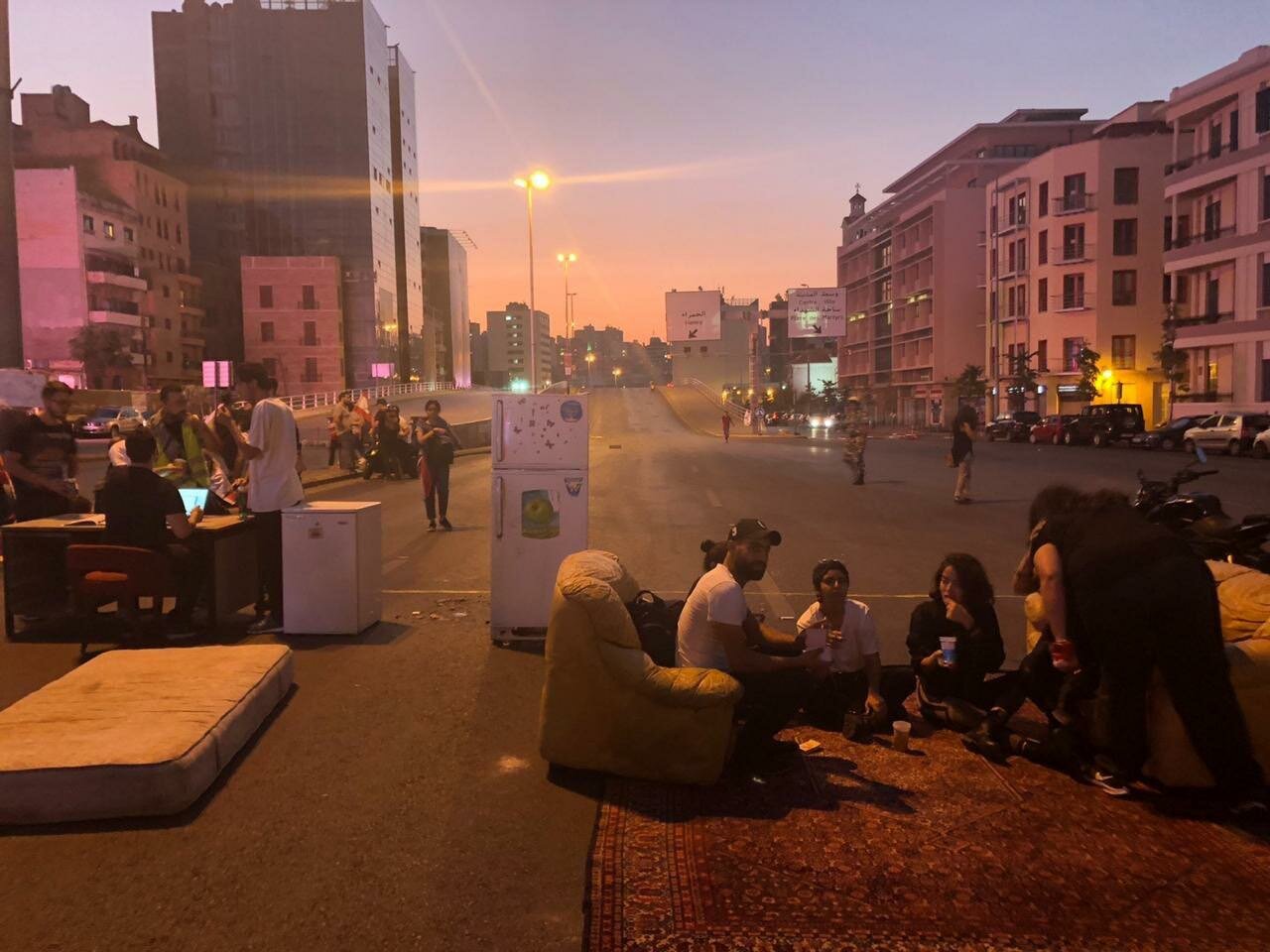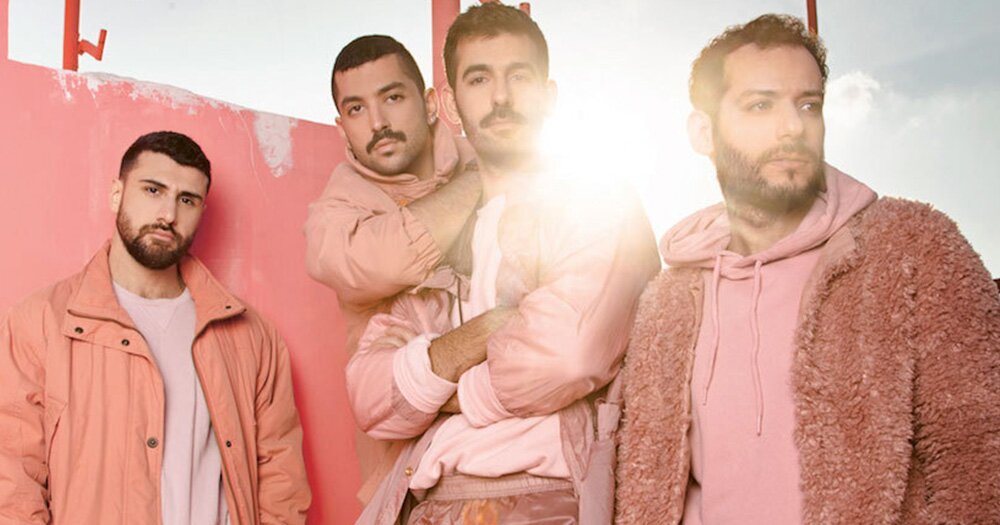A dozen days of the revolution have passed. Humor has been alive in every past second. It is more than just a coping mechanism, and it would only be reductionist to treat it as such–it surely is a catalyst for hope. You wake up every day curious to see what more your fellow Lebanese people have come up with; from witty signs, to rhyming chants, to memes, videos montages and more.
One of the biggest achievements of the revolution from its early days was rebuilding the trust Lebanese people have in each other; a faith that your friends, neighbors and even strangers will persist in the fight for your rights. Trust is intrinsic in instilling the strong belief of people in their revolutions, leading to the successful feeling of unity. Once the people are able to trust themselves, they acknowledge the power of the revolution and consequently contribute in keeping it alive until needs are met.
Trust was not solely built on the physical capacity and endurance of protesters in the first few days, but also in their rational and creative capabilities. For instance, in the second and third days of the protests, when accusations and doubts of protests’ peacefulness arose, humor surfaced as a primary strategy of refutation. Soon enough, an image of a young man lounging in an inflatable pool in the middle of a protest went viral. Many other pictures followed, like those of groups playing cards in the streets and men and women smoking their arguileh’s in Martyrs’ Square. These extreme gestures of tranquility were loud statements themselves, discrediting any attempt at portraying the Lebanese masses as violent. The funny captures created an unspoken competitive spirit between youth, to find new creative ways to protest peacefully, as caricatural and peaceful as it can get. Intentions surely varied from simply wanting to go viral in the “coolest” way possible to wanting to make a conscious political statement.
What do humor and joking really do?
In joking exists a freedom of speech that cannot be equaled in other forms of expression. To chant for the prime minister to leave (“Ir7al”) is different than holding a sign with a pink wig photoshopped on the PM’s face, denoted with “Sashay away”, a statement phrase from the popular American show RuPaul’s Drag Race. Surely, revolutions open a space for expression, but jokes further raise the ceiling for creative statements and demolish any limits to what can and cannot be ethically said about political figures. After all, humor defies ethics, rendering the usually-offensive or problematic widely accepted. Joke by joke, the walls between authority and people are torn down, and the people gain more power to attack the system they want to dismantle. Direct humoristic humiliation of authority figures, among many other tactics, robs the government from its respectability and thus legitimacy.
Another face of humor is its symbolism for resistance. The Lebanese revolution is not a crying revolution. Tears have been shed. Martyrs have fallen. Masses are in excruciating emotional, physical, financial and moral pain. Yet, people still find energy to joke and use their humor to fight back against politicians and regular people in their houses that are vilifying the revolution.
Humor is but a marker of people’s patience and endurance. In no way is it giving up or showing an inability to be serious. Without responsibility and accountability, the revolution wouldn’t have made it this far. Yet the “magic” of the revolution, that so-popularly talked about, lies within the millions living in the streets, protesting day and night, and still having enough energy the next day to stand back on their feet and dabkeh, install a full DJ set in the main square in Trablous, and rave till 3 am in the Egg… These raves are not a desperate need to party but an absurdly hilarious act of resistance and expression. Both a celebration of the reclamation of public spaces and of giving the power back to the people, these somewhat-comical extents of partying help keep the flame of the revolution alive and pumping.
An additional sign of resistance are the jokes that promptly flood the internet and WhatsApp groups after each speech from a political figure. Examples include the many jokes around the presidents’ low-budget video editing production, the whole campaign of videos and pictures responding to claims of external and political funding of protests, and the not-to-be-forgotten hundreds of tweets and film posters mocking the 72-hour wait proposed by the prime minister.
Through laughter and joke-making, the people resist the unreasonable speeches trying to shut the mouths of the unstoppable protestors closed. In fact, the road a protestor is willing to take to orchestrate a full living joke, in itself, is a measure of their endurance and determination. If you are willing to bring out to the Ring a full set of couches, a big carpet, a fridge and some other appliances to create a full house on the street to block the roads, and even make an Airbnb listing of that hilarity of a scene, it only indicates the infinity of measures you are willing to take to make your revolution win your people their rights.
Certainly, joking the system away is not what the revolution is entirely about. It is but one way of revolting and expressing. Good humor alone is insufficient in toppling a complete political structure,yet it remains one of the most potent fuels keeping the revolution engine functioning, push people to think beyond limits, and act the opposite of what is expected from them. Humor is not irresponsible. It is one of the methods.
“You can dance. You can block roads. You can write. You can chant. You can break things. You can change your behavior. You can write statuses. You can feed the masses. You can rave in Trablous. You can clean up the morning after. You can hug someone. You can rest. You can have an arguileh in Martyr’s square. You can fuck. You can form human chains. You can ignore politicians. You can play Tarnib on the ring. You can make art. You can stay home. You can be yourself. You can pray. You can curse. You can dream. You can debate. You can volunteer. There are a million ways to make a revolution. All of them valid. All of them needed.” -Raja Farah, known as on Instagram.





